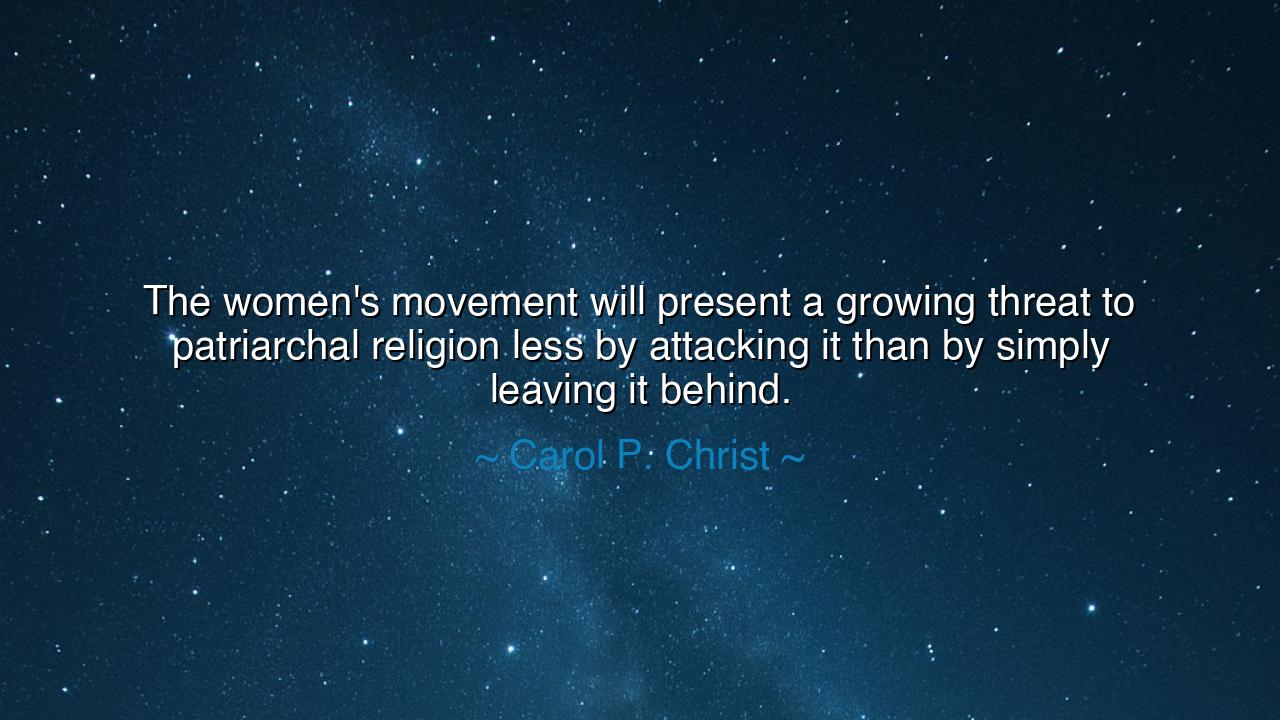
The women's movement will present a growing threat to patriarchal
The women's movement will present a growing threat to patriarchal religion less by attacking it than by simply leaving it behind.






"The women's movement will present a growing threat to patriarchal religion less by attacking it than by simply leaving it behind." These words by Carol P. Christ speak to a profound shift in the way women engage with religion and spirituality, and how this shift poses a challenge to the patriarchal structures that have historically dominated both religious and societal systems. Christ's assertion is powerful because it suggests that the most effective way to undermine patriarchal religion is not through direct confrontation, but by moving away from it entirely. By leaving behind the structures that have long sought to control and limit women’s roles, the women's movement threatens to render obsolete a system that has relied on the obedience and submission of women to patriarchal authority.
This idea finds deep roots in the teachings of the ancients. Consider the example of Socrates, who challenged the Athenian establishment and questioned the established norms of his time. Though his primary focus was not on gender equality, Socrates believed in the importance of individual autonomy and personal enlightenment, both of which were heavily restricted for women in ancient Greece. Socrates' emphasis on reason and the empowerment of the individual mind paved the way for future thinkers to consider the roles of women in society and religion. His philosophy indirectly challenged the rigid gender norms that existed, calling for a broader conception of human potential, regardless of sex or social class.
Plato, too, in his Republic, challenged traditional views of women’s roles by suggesting that women should have the same opportunities as men to become philosophers and guardians of the state. While Plato did not fully envision gender equality as we understand it today, his ideas planted the seeds for future generations to question the patriarchal structures of his time. The women’s movement, then, can be seen as the modern manifestation of this ancient push for freedom and equality, where women no longer accept subjugation as the norm but demand a world in which they are free to pursue their own destiny.
The women's suffrage movement in the early 20th century marked another profound step in this journey. Emmeline Pankhurst, Susan B. Anthony, and other suffragists took on the deeply entrenched patriarchal systems of their time, fighting for women’s right to vote and to have their voices heard in the political sphere. Yet, as Carol P. Christ suggests, the real threat to patriarchal systems does not always come from direct conflict or protest, but from a gradual withdrawal from the old structures altogether. The suffragists did not merely seek to change laws; they sought to build a world where women no longer had to submit to a patriarchal system. By demanding a voice in the public and political realms, they made clear that their freedom was not negotiable.
The modern feminist movement has continued this trajectory, questioning and often rejecting the traditional religious and social structures that have kept women in subjugation. Women have increasingly turned to spirituality outside the bounds of patriarchal religions, seeking alternatives in goddess worship, earth-based spirituality, and ecofeminism. These movements emphasize the sacredness of the feminine and the reclaiming of power that has been denied for centuries. Christ’s perspective is clear: the more women disconnect from patriarchal religion, the less relevance those religions will have. Their withdrawal poses a profound challenge to systems that rely on women’s submission to male authority.
This shift is not just about leaving religion behind, but about creating new spaces where women can explore and express their spirituality without the constraints of patriarchal norms. Mary Daly, a feminist theologian, wrote extensively on the need to reclaim women’s power within the religious realm, famously declaring that “if God is male, then male is God.” Daly’s radical reimagining of religion called for a complete separation from patriarchal religious structures and the creation of new, empowering religious narratives that center the divine feminine. The rise of these new forms of spirituality further exemplifies Christ’s argument that the most effective challenge to patriarchal systems lies not in direct confrontation, but in the quiet yet powerful act of leaving behind the structures that oppress.
The lesson from Carol P. Christ’s words is one of empowerment and self-determination. Women’s movements have long been a force for social change, but as Christ suggests, the ultimate power lies not in fighting against the structures that limit women, but in creating and embracing new ways of being—spiritually, socially, and politically. By moving beyond the confines of patriarchal systems, women reclaim their autonomy and spirituality, defining themselves on their own terms.
In practical terms, we can follow this path by questioning the systems that have shaped our own lives and seeking new ways of expressing our own personal truth and empowerment. Whether through personal reflection, community building, or alternative spiritual practices, we must choose to embrace our own power and challenge the systems that seek to limit us. By doing so, we not only free ourselves but also pave the way for future generations to live with a greater sense of agency and freedom, just as the women of the past have done before us. The power of leaving behind is not just in the act of separation, but in the act of creation—creating a new world where we are free to define our own futures.






AAdministratorAdministrator
Welcome, honored guests. Please leave a comment, we will respond soon